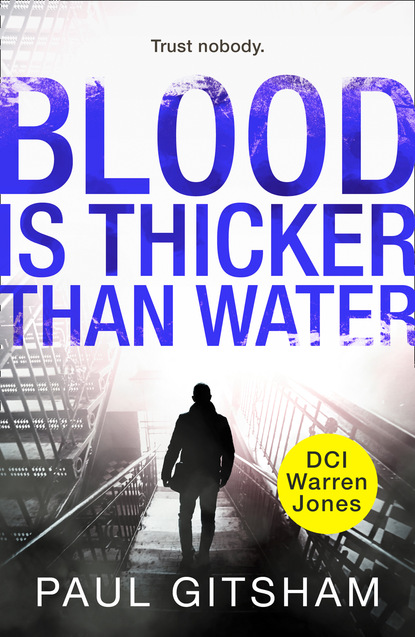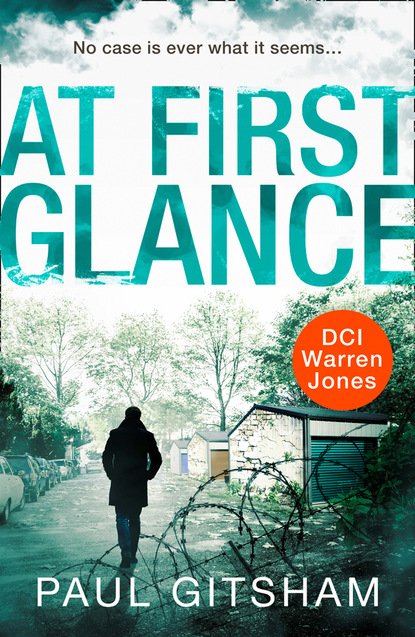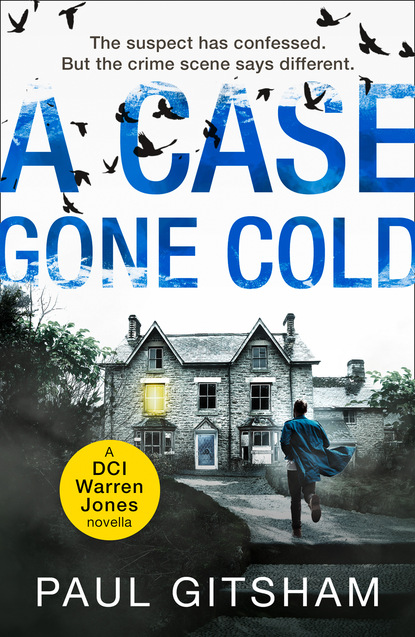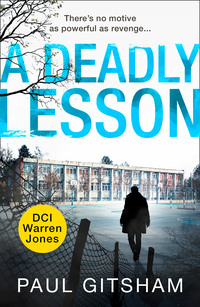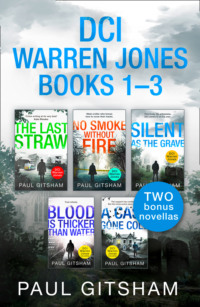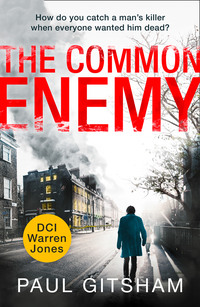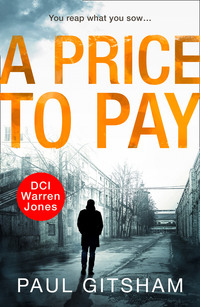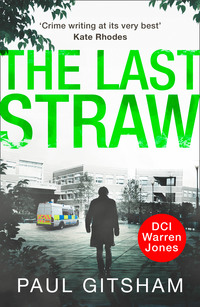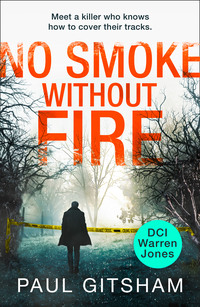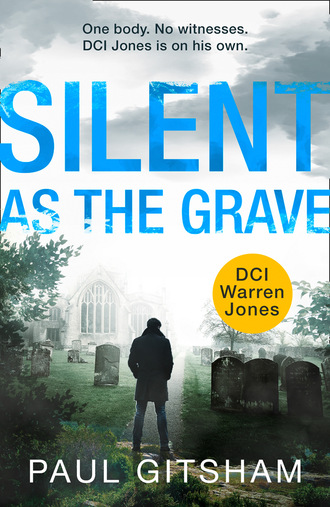
Полная версия
Silent As The Grave
Aside from a few young boys kicking a football at a makeshift goal made from rolled-up jumpers at the other end of the open field, the two men were now alone in the middle of the common. Nobody could possibly overhear them and Sheehy would have plenty of warning if anyone tried to approach.
“Well I’m here. What have you got?”
Warren’s tone was testy. So far Sheehy had been in charge and Warren was determined to regain the initiative.
“I can point you towards the killer, but first I need a promise from you. I need your word.”
Warren stared at him for several seconds, searching the man’s face.
“What sort of promise?”
“I need your help.”
Warren thought for a long moment. It didn’t take a detective to work out what the man was after. But what did he think Warren could do?
“What’s in it for me? How do I know that you even have the information you claim?”
“A show of good faith. I can identify the person who ordered Reggie Williamson’s death and another killing you aren’t even aware of. Then, after you help me I have other information. Information that you don’t even know that you want yet.”
“What sort of information?”
Sheehy shook his head. “First you have to help me clear my name.”
It was exactly what Warren had been expecting but he was confused. “I don’t see what I can do to help. I have no influence on the outcome of the investigation. It’s in the hands of Professional Standards; in fact I’d even question whether it is appropriate for us to be having this conversation.”
“You’re the only one I can turn to, Warren. This whole thing is not about whether or not I took a bribe. It goes much, much deeper than that. It’s not even about clearing my name. It’s about righting an injustice and making sure that evil men are put away for a long time.”
Warren ignored the man’s familiar use of his first name and his attempt at stirring rhetoric; he wasn’t naïve enough to be persuaded by that old trick.
“Again, I don’t see what I can do to help you—Standards are investigating the case and I have no access to their files or even their officers—by definition they have to be free from outside influence. I doubt they’d even grant me an audience. I didn’t arrive until months after your arrest—this is the first time I’ve met you. Why the hell would they listen to me?”
He was starting to lose patience with the man. He was clearly a drinker and obviously clutching at straws. This afternoon’s operation had cost the force a considerable amount of manpower and resources; if Sheehy had nothing to contribute to the Williamson case, then Warren was strongly contemplating arresting him for wasting police time. He said as much.
“Warren, I can help with the Williamson case and others, but it has to benefit both of us. I need you to help me fight these charges.”
Warren shook his head in exasperation. “Haven’t you listened to anything I’ve said? I can’t intervene on your behalf. I have no influence here. You must know this. I don’t understand why you want me to become involved.”
Sheehy looked at him for several long, hard seconds. When he spoke again, his voice was low, almost gentle. “Warren, you are already involved. You’ve been a part of this since the moment you walked into that garage and found your dad dead in his car.”
* * *
It was as if Warren had been punched in the stomach. All of the air left his lungs and he felt a wave of nausea pass over him. Immediately, the memories flooded back. He could taste the coppery tang of fear, feel the painful pounding of his heart, smell the choking exhaust fumes as they filled his nose and mouth. It was a smell that to this day Warren hated. As a teenager out clubbing in Coventry he’d always make sure he was upwind of the taxi rank, the smell of their idling engines making him feel sick. He’d loathed the old Pool Meadow bus station, with its lines of chugging buses filling the air with smoky pollution.
Somehow, he found a voice, forcing it past the tightness of his throat. “You have ten seconds to explain yourself before I arrest you for wasting police time.”
Sheehy ignored him. “What do you know about your father and his death?”
The voice that answered sounded like Warren’s but it seemed to come from a long way away. “He killed himself after stealing money from a drugs bust.” The voice dripped with bitterness and resentment.
“What if I told you that he didn’t kill himself? That he never stole that money.”
If Warren hadn’t felt so weak and disoriented he’d have punched the man in the face as hard as he could. Could the man stoop any lower, invoking the name of Warren’s father in a crude attempt to manipulate Warren into helping him? It was nearly a quarter of a century ago and Warren had suppressed his feelings for much of that time, but they never went away. And they hadn’t softened. The hurt, the betrayal then finally the anger and, yes, even hatred towards his father. The man he’d admired and looked up to, even wanted to be when he was older—that man had torn Warren’s world apart. To know that his father had chosen to leave them had hurt so hard—that he had been unable to save him had hurt even more.
And then came the revelations. Thousands of pounds seized in a drugs bust, half of it going missing between the crime scene and the evidence room at the police station. His father’s gym bag, housing sweaty towels, stained T-shirts—and wads of fifty-pound notes wrapped in elastic bands.
Quite why his father had decided not to collect the bag from his locker—he would probably have gotten away with it—instead choosing to kill himself, was never satisfactorily answered. Perhaps he had stolen the money on a whim, then felt guilt at what he had done? Unable to face the shame, he’d taken his life that early summer evening.
That was what his mother had clung onto, even as she saw her husband’s memory destroyed, as friends from the force stopped calling or avoided talking to her when they bumped into her in the street. The name Niall MacNamara was toxic and Warren wanted nothing to do with it.
“Leave now, before I make you.” It was all Warren could do to force the words past his clenched teeth. He no longer cared about Reggie Williamson, he just wanted this man out of his life; he could feel the sweat on his brow. It was as if Sheehy had slammed a wrecking ball into Warren’s carefully constructed defences, bringing down the walls. Warren needed time to rebuild them, to reconstruct the ancient structure.
Sheehy ignored him. “Warren, your father was a good man; he was an honest man. He wasn’t a thief…and he didn’t kill himself. I know this. I’ve known it for twenty years. And everything that’s happened recently—it all stems back to what happened that night.”
Warren closed his eyes, concentrating on breathing. He wanted nothing more than to race back to his car, to leave in a cloud of burning rubber and run and hide. But he couldn’t. The memories from that horrific evening had left their mark, but now another scar was itching. One he’d ignored but which was now shouting for attention. Why? Why had it happened? He had to know. He was trapped. If he left now, refusing to let Sheehy talk, he could never have peace. A long-dormant seed had started to germinate and he had to know the truth.
“I knew your father back in the late eighties. We met about two years before…you know. I was a young DC, with only a couple of years’ experience.”
Sheehy stared at his feet. “I was working in North Herts, but I was seconded to West Midlands as part of a small team working as liaisons on the investigation into a huge, cross-county crime ring. Your father was a senior detective sergeant on that team and we worked closely together.” Sheehy raised his head, looking Warren directly in the eye. “He was a good man. And I liked him a lot.”
Warren didn’t trust himself to speak.
“It was a massive enterprise. Basically, it was modelled on the Italian Mafia: drugs, prostitution, stolen goods—you name it; these guys did it. And they were ruthless, anyone who crossed them ended up dead.
“But they were also clever. All of the action was taking place in the West Midlands—Birmingham, Coventry, Nuneaton. But the guy who headed it lived in North Herts and was ostensibly a legitimate businessman. He owned a string of restaurants, fast-food places, leisure centres, B&Bs, minicab firms—you name it. He partnered local tradesmen. All cash businesses. All built from scratch or bought legitimately, with no links to the Midlands and no evidence of any wrongdoing. They even had a charitable foundation, helping unemployed kids learn skills and trades. Local politicians loved him and he was on the front page of the local newspaper at least once a week.
“But, we knew the bastard was a crook. The Hertfordshire businesses were just a front and a way of laundering money. Back in those days you could move money around a hell of a lot more easily than now and a secret Swiss bank account really was a secret. He was worth millions. And he was a murderer. We knew of cases going back to the nineteen seventies—drug dealers mostly but the odd prostitute as well.
“The problem was we couldn’t prove it. He covered his tracks too well. And he rarely got his own hands dirty. We busted a few dealers here and there, but there was never any direct link to him. Witnesses had a tendency to suddenly develop amnesia or even to disappear. We were going nowhere fast. We needed a break.”
Sheehy paused. “You have to realise, Warren, that we knew this guy was filthy. In fact we had tons of evidence that placed him right in the centre of his little ring. Most of the grunt work was carried out by his right-hand man, but it was him that we wanted. What we didn’t have though was the one remaining piece that would open up everything else. He was too high profile for us just to go on a fishing expedition—we’d never get a warrant to search his house or business premises. And that was what we needed. With a warrant we would be able to raid him and that would be enough to open a bridge between the evidence we had and him. But without that information, we didn’t have enough to get a warrant. Catch-22.”
Warren didn’t like the sound of this. Where was it leading? He also had a suspicion about who Sheehy was talking about—and the implications were massive.
“What did you do?” His voice was slow, steady.
Sheehy licked his lips nervously. “Although he kept his hands clean most of the time, it wasn’t always that way. Back in the early eighties, he was dabbling in the club scene—supplying drugs to clubbers. The problem was that if you really wanted to make money, you needed the clubs—or at least the door staff—on your side. And most of the clubs that were willing to take part were already under the control of a guy named Frankie Cruise.
“He approached him about a partnership, but Cruise was an arrogant bastard and wouldn’t play ball. In the end, he shot Cruise dead. The mess was all cleaned up of course, but everyone knew what had happened. In fact he encouraged the rumours to enhance his own reputation. But obviously, that wasn’t good enough for court and no judge was going to grant us a warrant based on that. Especially not for someone so high profile and well connected; he knew where all the skeletons were buried.
“However, ballistics recovered a nearly intact bullet from Cruise after his body floated back to the surface in Coventry Canal. It was no good to us without a gun though.
“Then in mid 1987, we got word that he had been boasting at a party he was hosting at that Hertfordshire mansion of his, about how he had killed a man. He must have really wanted to impress his guests because he eventually went up to his bedroom and fetched the handgun that he claimed to have used to kill Cruise. He was brandishing it like some sort of trophy.”
Sheehy paused. “Your father and I knew that was the weapon he had used, and that it was the final piece of evidence that could blow the whole case open. But we still couldn’t get a warrant. We were told it was just hearsay. The PACE regulations were still fairly new and nobody wanted to be seen to be harassing such a prominent local figure.
“So we made contact with his handyman, who was unhappy with the way he was being treated. We persuaded him to steal the gun, which was kept in his bedroom.”
Sheehy, looked away, unable to meet Warren’s eye.
“You have to realise, we knew that he was guilty. We had so much evidence. That all came out at his trial. It just needed a catalyst to start everything working.”
“So you planted the gun and framed him for murder.” Warren’s voice was bitter. He felt sick.
But Sheehy was shaking his head vehemently. “No! We didn’t frame him for anything he hadn’t done. We just left the gun at the scene of a drugs raid. It was collected along with a load of other weapons. Routine ballistic testing linked the gun to the Cruise murder. There were fingerprints all over the gun. Luckily for us, he’s had a few run-ins with the police over the years. Usually all the charges were dropped when the witnesses mysteriously changed their minds, but his fingerprints were still on file.
“All it did was give us the excuse to raise a warrant. As soon as that happened, we were able to build that link between him and the case we’d built. The case was sitting there, ready to go. It just needed that link.”
“Vinny Delmarno.”
It wasn’t a question. The man had been released whilst he was still with West Midlands Police and there had been anger about the things that had been said in the press. Allegations of corruption and fabricated crime scenes—allegations that Sheehy now claimed were true.
Sheehy nodded but said nothing as if speaking the man’s name out loud was a curse.
“So why are you telling me all of this now?” Warren’s voice was bitter, the anger now simmering just below the surface, “It can’t just be an attack of conscience. You’ve had over twenty years to come clean. Delmarno’s been out how long now?”
Warren was confused; it made no sense. By all reports, Sheehy was in deep trouble already. What benefit was there to adding this long-forgotten miscarriage to his litany of sins? It was clear from his tone that he felt that what he and Niall MacNamara had done all those years ago was still right. Noble-cause corruption they called it.
Sheehy looked at his hands and Warren noticed they were trembling. “Reggie Williamson was the gardener who supplied us with the gun.”
“That’s what this is all about?” Warren couldn’t hide the scepticism in his voice. For sure it was a hell of a coincidence, but surely that was all it was?
He said as much.
“When Vinny Delmarno was released, he swore blind that he would find out who put him away and would get his revenge.”
Warren still wasn’t convinced.
“There’s more.”
Sheehy opened the coat, revealing the concealed file folder, and removed a newspaper article, handing it over. A cutting from a local Hertfordshire paper from February, page one but not the lead. Stapled to the back was a narrow column from page four, continuing the story; a black-and-white headshot, formal-looking and probably taken from an official website, took up barely two inches.
Retired coroner and wife killed in drink-driving smash: Verdict
A former coroner, killed in the early hours of 31 December 2011, was driving too fast and was under the influence of alcohol, an inquest ruled today. The crash, which killed Dr Anton Liebig, 67, and his wife Rosemary, 66, instantly, happened after a sharp bend on the A5062, on the way back from an awards dinner at The Allingham Golf Club in Hertfordshire, where Dr Liebig—captain of the senior men’s team—had presented several trophies.
A police spokesperson said that skid marks at the scene of the accident revealed that Dr Liebig had rounded the blind bend at a speed in excess of fifty miles per hour, before apparently losing control and leaving the road, where he hit a tree. A post-mortem revealed a blood alcohol level of 85 milligrams per 100 ml. The legal limit is 80mg.
The coroner, Dr Lila Schiff, called upon North Hertfordshire District Council to look into the safety of that stretch of road, which has been the scene of numerous serious accidents in recent years, resulting in three fatalities.
Dr Liebig worked as a coroner throughout Warwickshire, before retiring. Rosemary Liebig was a keen painter. They are survived by a son and two grandchildren.
Warren finished reading the report and looked up at Sheehy. “So?”
The story meant nothing to him. He worked in Middlesbury CID. The incident would have been dealt with by traffic down in Welwyn. Besides which, Warren had had enough on his plate over the new year to worry about the ins and outs of some drink-driver.
Sheehy took a deep breath. “Anton Liebig was the coroner who oversaw your father’s inquest, Warren.”
Sheehy’s voice was fading out, replaced by the sound of blood rushing through Warren’s ears. His father’s inquest.
He still remembered that day. The courtroom had been nothing like he’d expected it to be from the TV. A small, wood-panelled room with a row of tables for the “interested parties” to sit—interested parties such as Warren, his mother and his grandparents. A chair sat empty for his brother who hadn’t come home the previous night. Behind them several lines of blue plastic chairs constituting the “public gallery” were mostly filled with journalists, representatives from the Police Federation and a few family friends. Nobody from the station that Niall MacNamara had worked at for more than half his career were present. None of his police “friends”. He’d been dropped; nobody wanted to be associated with him now, the thief who’d stolen drugs money then taken the coward’s way out.
The formal hearing had been a short, almost anti-climactic affair, delivered by the coroner sitting at his slightly raised dais, a much younger version of the man in the newspaper photograph. The family already knew the verdict, having been told quietly beforehand.
Suicide. Carbon monoxide poisoning from his own car engine, administered by a hosepipe attached to the exhaust, an empty bottle of whisky by his side. Found by his teenage son. No suspicious circumstances.
No mention was made of why he did it; that was beyond the purview of the court. But everyone in that room knew the rumours, were aware of the investigation underway. And you can’t libel the dead.
Sheehy’s voice pulled Warren back to the present. “Your father didn’t commit suicide; he was killed. Revenge for what he did? I don’t know. But I knew the moment I got the call about your dad’s death it wasn’t a suicide. I’ve known for over twenty years.”
He continued to avoid Warren’s eyes, having the sense not to try and apologise. He couldn’t; the words didn’t exist that could in any way lessen his guilt, to begin to atone for the literally decades of hurt that he’d help cause.
“Why?” That one word was all Warren could manage. A half-dozen questions were all rolled into that one word.
“Fear. I was scared, Warren. Shit-scared. They’d killed your father and covered it up. Somehow they hadn’t fingered me as his accomplice—too junior I guess. My name didn’t appear on any paperwork. So I kept quiet.”
He still wouldn’t meet Warren’s eyes.
“He was supposed to die in prison, kidney failure. He’d been on dialysis for years. They even put it forward in mitigation, tried to get him a shorter sentence. Perhaps it worked. With the case we had he could have gotten life with thirty years. He got twenty-two. I forgot about him. Got on with my life.
“And then he got a new kidney. God love the NH fucking S. His name came up on the transplant list as the best match and before you know it some poor donor’s kidney is inside that bastard’s body.
“The kidney took, he served the rest of his sentence and now he’s free.”
Sheehy’s voice was a mixture of bitterness and fear. “And now he’s clearing the decks. Settling scores and cleaning up his mess. Reggie Williamson for his betrayal and Anton Liebig because he was a loose end who could link him back to his first act of revenge—the death of your father.
“And that just leaves me. I’m the only one left.”
Warren found his voice. “I still don’t understand. What has this got to do with the current investigation into your misconduct?”
“It’s a set-up; it’s all fake. Delmarno wants his payback, but killing me would be too easy. He’s had two decades to dream about what he wants to do to me and he wants to do it slowly. He wants to ruin me, send me to prison and make me suffer like he did. And then, when I’m finished and due for parole, that’s when he’ll probably make his final move. I’ll be dead before I walk out that prison.”
Chapter 10
Warren received a less than rapturous welcome when he returned to the station.
“My office, now.”
The roasting from Grayson was pretty much what he’d been expecting; the man had been unable to decide which of Warren’s misdemeanours should be addressed first and in the end had simply settled on a chronological listing: getting in a car with a potential killer, removing his earpiece so he could no longer receive instructions, leaving a contained area with a suspect, circumventing surveillance and ignoring procedures for the collection of a witness statement.
However, Grayson had reserved most of his vitriol for Warren’s apparent agreement to help his predecessor fight the charges against his name. Sheehy had said nothing about it where they could be overheard, but Grayson wasn’t a fool. It was obvious that was what Sheehy was after.
“It’s not your job to help some bent copper fight Professional Standards. The Federation and his lawyers can do that. You’ve got enough on your plate solving this murder; besides, we can do without the negative publicity. We’re going to have enough shit flying at us when this comes to court next month without the press getting wind of your escapades.”
Warren stood and took the flak, mostly allowing the shouting to wash over him. It was to be expected and he was too emotionally tired to care about a bollocking that would ultimately lead nowhere. Regardless, he was struck by two remarks all-but buried within the verbiage; the first a cynical observation that Grayson had never concerned himself before with the amount of work piled on Warren’s “plate”—he usually loaded it as gleefully as a glutton at an all-you-can-eat buffet. Secondly, it was the first time that Warren could recall the man referring to Middlesbury as “we” or “us”.
After the obligatory threat that he was contemplating suspending Warren, Grayson finally asked what Sheehy had to offer.
“That’s it?” he responded when Warren had finished. “This Reggie Williamson offered a gun to Sheehy back in the 1980s, which Sheehy then planted at the scene of a crime to frame him and now this Vinny Delmarno character wants his revenge? Sheehy really is a dirty bastard. It sounds like it’s all coming back to bite him on the arse.”
“Well, it’s not as if Delmarno is an innocent in all of this,” Warren found himself defending Sheehy—a position he was not exactly comfortable with.
Grayson was dismissive. “Who gives a shit about Delmarno? He got what he deserved. Besides, it’s clear that Sheehy has form when it comes to corruption.” He sighed. “Regardless, it’s something. See where it takes you. Is there anything else?”
“No, sir.” The lie came more smoothly than Warren was comfortable with.
“Well let’s hope this leads us somewhere. This afternoon’s little jaunt cost us an arm and a leg.”
The dismissal was clear and Warren wasted no time turning for the door.
“Oh and Warren, take that bloody stab vest off or everybody will see through this carefully cultivated, cuddly facade.”
* * *
Warren’s first stop on leaving Grayson’s office was DS Peter Kent’s desk. The veteran detective looked up.
“You survived, I see. Those vests are worth every penny.”
Warren smiled tightly. “Apparently coming out of the Super’s office wearing one ruins his cuddly image.”


